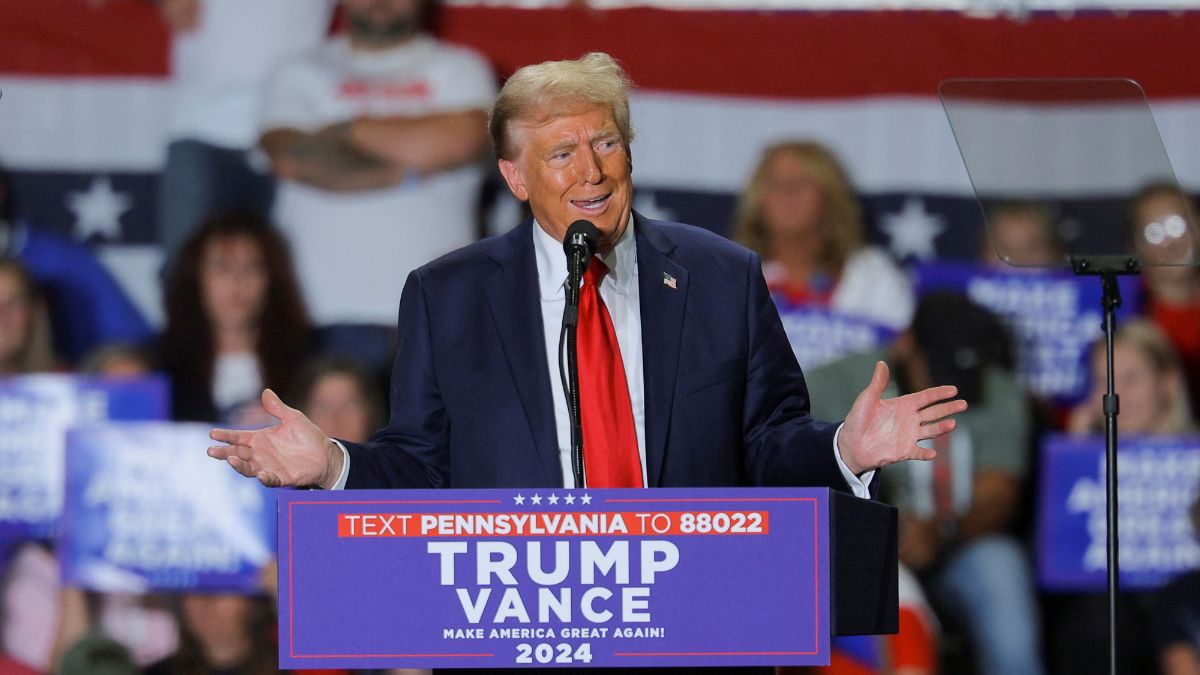Former United States President Donald Trump’s recent remarks proposing “one really violent day” to address crime have stirred a significant response. Delivered during a rally in Erie, Pennsylvania, Trump’s comments proposed a harsh, short-term crackdown on criminal activities.
What is Trump’s proposal?
At the Pennsylvania rally, just over a month before the Election Day, Trump suggested that law enforcement should be allowed to have “one real rough, nasty” and “violent day” to tackle retail crime.
He expressed frustration that police are unable to do their jobs effectively due to political restrictions and claimed that such a violent crackdown would stop crime immediately.
“One rough hour — and I mean real rough — the word will get out and it will end immediately, you know? It will end immediately,” Trump stated, continuing, “If you had one day, like one real rough, nasty day, the word will get out, and it will end immediately. End immediately.”
Despite the boldness of these statements, a Trump campaign official clarified that the remarks were not intended as a serious policy proposal. “President Trump has always been the law and order President, and he continues to reiterate the importance of enforcing existing laws,” said Steven Cheung, Trump’s campaign communications director. The campaign also suggested that Trump was merely “floating it in jest.”
What does Trump’s history tell us?
Trump’s recent remarks reflect his long-standing views on law enforcement, having frequently supported tougher police actions in response to unrest. In 2020, following racial protests related to George Floyd’s murder, Trump infamously praised police crackdowns, calling the violent response “a beautiful thing to watch.”
His history of endorsing police violence goes back even further. In a 2017 speech, Trump told police officers: “When you see these thugs being thrown into the back of a paddy wagon, you just see them thrown in, rough. I said, ‘Please don’t be too nice.’”
Trump’s rhetoric on crime extends to his claims that Democratic policies, particularly under US Vice President Kamala Harris, have caused chaos in cities. During the Pennsylvania rally, he falsely suggested that California laws allow shoplifters to steal up to $950 without consequences, linking the policy to Harris’ time as California Attorney General.
In fact, Proposition 47, which reclassified some theft offenses as misdemeanours rather than felonies, was passed by California voters in 2014, and the dollar threshold in question was established in 2010 under Republican Governor Arnold Schwarzenegger.
Harris remained neutral on the proposition. In the US, property crime rates have actually declined by 2.4 percent, according to FBI statistics. Murder and nonnegligent homicide rates are down 11.6 percent.
Is Trump’s proposal a bit Purge-like?
Trump’s remarks quickly drew comparisons to fictional and historical events. Critics pointed out that his proposal bears a striking resemblance to the plot of The Purge, a dystopian movie series where all crimes are legalised for 12 hours annually.
Left-wing political action group The Lincoln Project took to X (formerly Twitter), stating, “He’s just describing the premise of The Purge.”
One X user humorously remarked, “The way he watched The Purge and sat there like, ‘You know what? We should try this.’”
Others noted the unsettling similarity between Trump’s proposed violent crackdown and historical events like Kristallnacht, a Nazi-orchestrated wave of violence against Jewish people and businesses in 1938.
One X user posted: “In PA today, Donald Trump gave one of the most dangerous speeches of the 21st century by describing his strategy for reducing crime as Kristallnacht.”
For 11 hours after the speech, “The Purge” trended on social media, fueling ongoing debates about the dangerous implications of Trump’s rhetoric.
What’s behind the rhetoric?
Trump’s comments are part of a broader strategy in the 2024 US presidential race, where both Trump and Kamala Harris have positioned themselves as the best candidate for handling law and order.
Trump, who has the backing of police unions like the Fraternal Order of Police, presents himself as a tough-on-crime leader, while Harris leans on her prosecutorial background.
Also Watch:
Polling from Pennsylvania, where Trump made the remarks, shows that voters prefer Trump over Harris on crime and safety by a margin of 50 percent to 43 percent, according to a Washington Post poll conducted between September 12 and 16, 2024.
Yet, despite this lead, Trump faces legal challenges, having been found guilty earlier this year of 34 felony counts related to falsifying business records in New York. Sentencing is expected after the election.
Harris, meanwhile, is airing ads in key battleground states that highlight her work in law enforcement, saying, “Here’s the truth: My life’s work has been fighting on behalf of others. It’s why I became a prosecutor, district attorney, and attorney general.”
With inputs from agencies
)